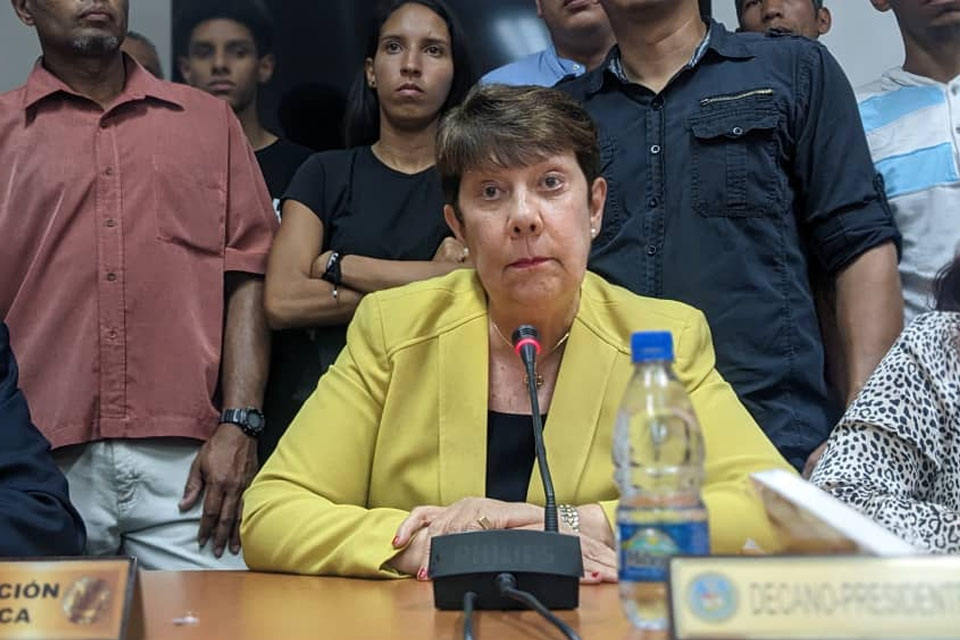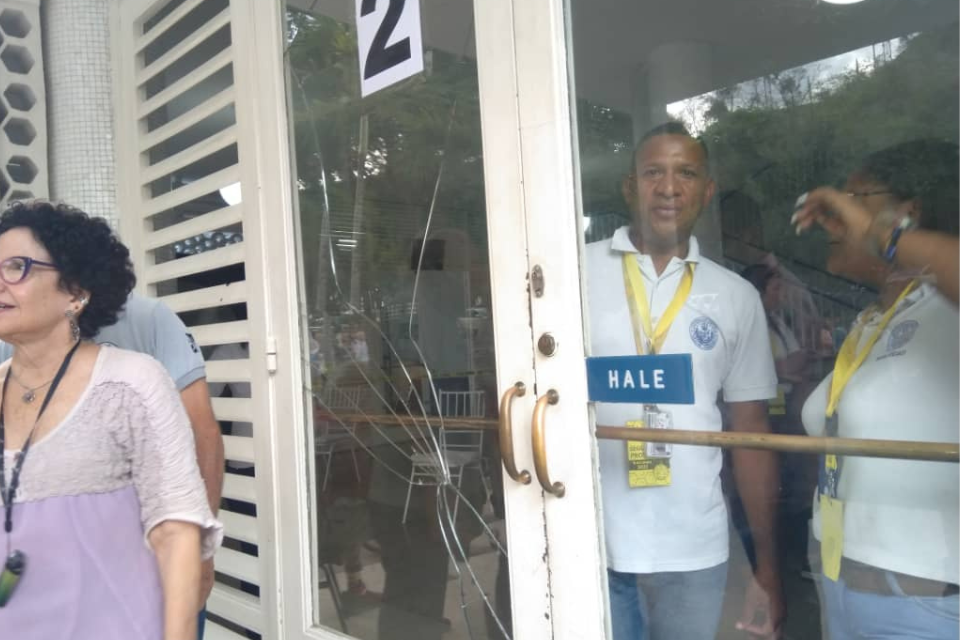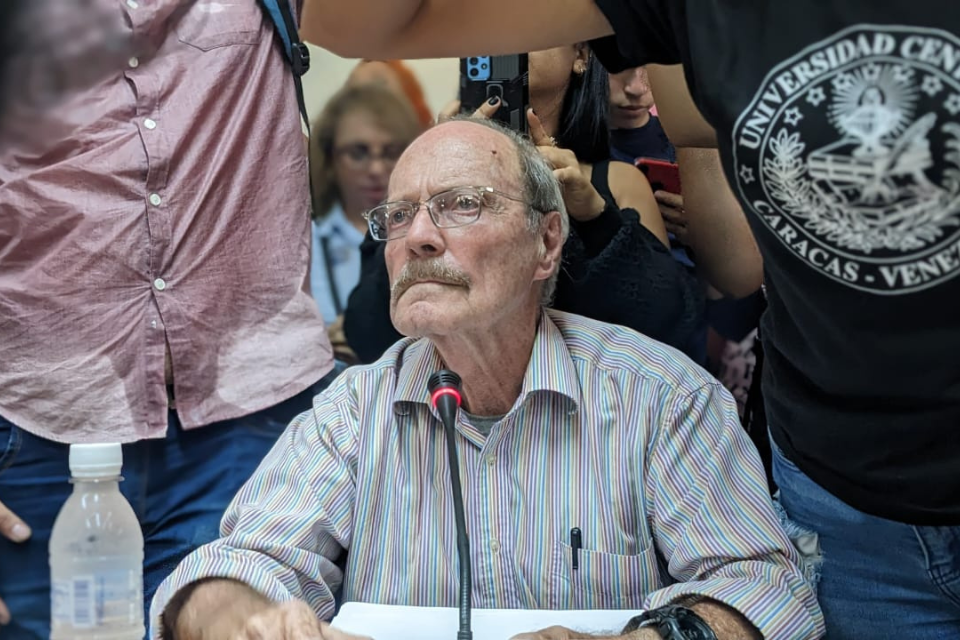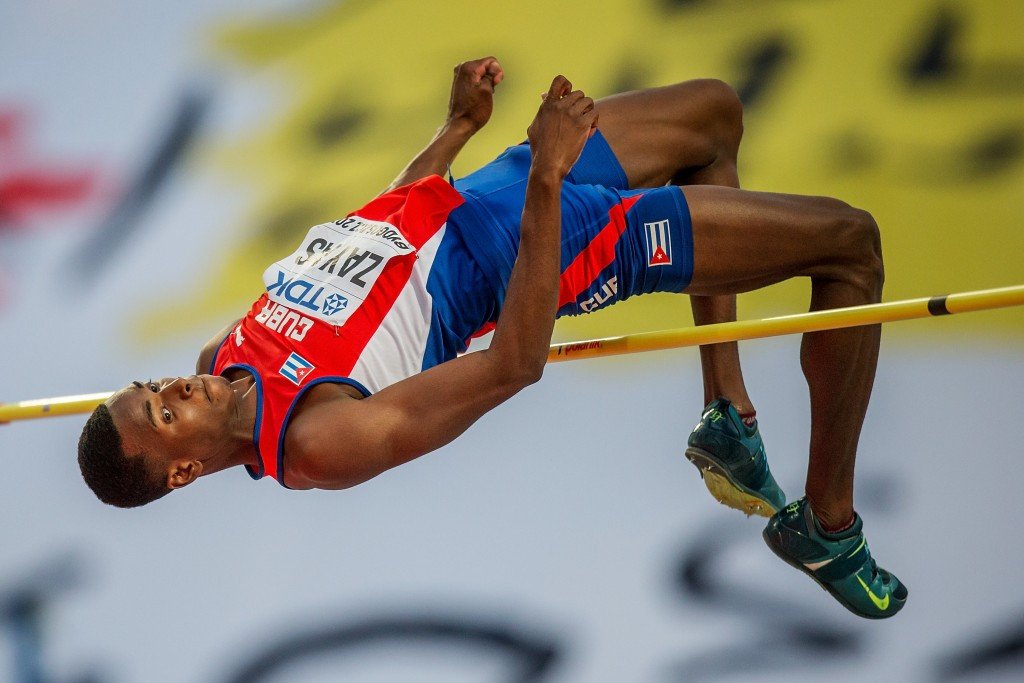After six hours of delay, mixed versions, floods, impatience, frustration and much confrontation, the “perfect storm” materialized for the UCV Electoral Commission to make the formal announcement that sparked the conflict: the UCV elections were finally suspended. and the new date will be June 9
Not even in all possible scenarios could what ended up happening in the highly anticipated UCV elections, scheduled for this Friday, May 26, be anticipated.
After six hours of delay, cross versions, floods, impatience, frustration and much confrontation, the “perfect storm” materialized for the Electoral Commission of the UCV made the formal announcement that sparked the conflict: the UCV elections were suspended and the new date will be June 9.
Since the date of Friday, May 26, was announced in February of this year, the expectation has been growing in the university community, along with the attention of public opinion. Step by step the schedule was fulfilled.
Everything was ready or should have been ready, until the night before the election. Here are some keys to everything that could go wrong in the process and that actually did.
1. A “slight delay”
At 8:00 a.m., the UCV Electoral Commission informed through its twitter account that the process scheduled to start at that time would be postponed until 9:00 a.m. and would last until 8:00 p.m. They assured that the decision had been notified to the university authorities, without major incidence in the process.
The Electoral Commission, given the problems presented, has decided that the electoral process begins at 9:00 am and ends at 8:00 pm. Decision that was communicated to the university authorities. #ElectionsUCV2023
— UCV Electoral Commission (@ComisionElecUcv) May 26, 2023
But around 10:00 in the morning, the lines of voters stretched across all the faculties and the process was stalled. Without getting any answers, most of the senior citizens who had been graduating and retiring in line since 7:30 a.m. became impatient and gradually the situation began to generate discomfort: many decided to leave with the hope of returning at the end of the afternoon to carry out their work. vote.
Jesús Mendoza, president of the Federation of University Centers of the UCV, reported that there was a delay in the delivery of the electoral party favors. Until then, the electoral party favors had only reached the Faculty of Dentistry, Sciences, Engineering, Economic and Social Sciences (Faces) and Legal and Political Sciences.
“The process had to start at 8:00 am and the tables are just beginning to open because the electoral party favors arrived very recently.”
2. The leaks “watered down” the process
At 10:30 am, the official version of the Electoral Commission was that a leak had flooded part of the space in which the material was stored. The first tweet indicated that this had been detected at 3:00 in the morning, but at the beginning of the process this was never mentioned. Three minutes later, the Commission showed in a second tweet another video with a brief phrase: “we were able to save the ballots”, so it was not considered a compelling reason that put the start of the process at risk.
This morning at 3:00 am at the headquarters of the Electoral Commission.
You only see what you want to see. pic.twitter.com/k2d5jCrh8W— UCV Electoral Commission (@ComisionElecUcv) May 25, 2023
We were able to save the ballots. #ElectionUCV2023 pic.twitter.com/g3lzP23kZw
— UCV Electoral Commission (@ComisionElecUcv) May 25, 2023
3. Sabotage, confusion and frustration
Around 11:00 in the morning, on the outskirts of the Faculty of Medicine, the candidate for rector, Enrique López Loyo, denounced that the long delay was a premeditated action to destroy material to delay the process and that people will retire. He warned that part of the material was being reprinted but that this would take time and asked the Public Ministry to investigate because although it had not rained the night before, one of the arguments for reprinting was that the material had been destroyed by a flood.
The rector candidate, Humberto Rojas, assured that after three hours of delay there was no formal explanation of what was happening and that if the process began at noon it would have to be extended until 11:00 at night.
The electoral regulations stipulate that the day must cover a minimum period of ten hours or until there are people waiting in line to vote.
4. The shipwreck of the ballots
With the arrival of noon, tempers were heated. Faced with the unison cry of “We want to vote, we want to vote!” Of those who were waiting in the Faculty of Humanities and Education (FHE), the members of the subcommittee managed to set up the tables with the boxes only for the vote of the graduates and the line began to move.
But the allergy was short. They only had 41 ballots available for an electoral roll of 29,200 graduates from the 10 schools that make up the FHE
In the 11 faculties, the row of professors was never inaugurated. The few ballots available were only those of the government (rectoral authorities and deanery), which allowed students and some graduates to vote, but since the ballots never arrived for the election of the candidates for the co-government (counselors and professorial representatives) the teachers, Those who make up the electoral roll, which has a 1-1 vote ratio, could never even get close to the polling stations.
*Read also: Nucleus of the UCV in Maracay completed elections and asks to be outside the suspension
A source from the Electoral Commission explained that since administrative employees and workers were included for the first time in these elections, an additional problem had arisen: both groups appeared in the final registry, but there were no electoral notebooks in which to sign when voting.
5. The meeting of discord
At 2:00 in the afternoon the situation was untenable. The seven candidates had met at the Faculty of Medicine together with the authorities and the members of the Electoral Commission to announce what was already urgent: the elections were suspended.
#Ucevistas The Electoral Commission has deferred the voting process, after the multiple failures shown to install the act. The University Council of the #UCV you will have to establish a new date for its completion.
Soon we will offer a firm position of our team pic.twitter.com/sBEA5oTsA4
— Paulino Betancourt (@p_betanco) May 26, 2023
The rector candidate Paulino Betancourt ratified the information and said that “due to multiple failures to install the act”, for which the date would be deferred. Betancourt expressed that the entire Electoral Commission must resign and that it is not enough for the president of the instance to place his position in order.
Meanwhile, at the entrance of the academic coordination of the Faculty of Medicine, there was a group of students who demanded to enter the meeting and between pulling, shoving, and a lot of pressure they broke the door and burst into the room where the rector Cecilia García Arocha was.the secretary Amalio Belmonte, the president of the Electoral Commission Carlos Martín, the former president of the Association of Professors of the UCV (Apucv), Víctor Márquez, Ricardo Ríos, professorial representative before the University Council and another of the candidates for rector, Miguel Alfonzo.
Live | Students outside the medical school demand to enter. Meanwhile, another group of students is meeting with members of the Electoral Commission and CU where they talk about the new date of the electoral process to elect the authorities… pic.twitter.com/oXjZD7gI00
– TalCual (@DiarioTalCual) May 26, 2023
The president of the Electoral Commission proposed June 9 as a new date for the UCV elections. «It is an appropriate date because this election was already organized. What happened? Like you, I was beginning to be surprised this morning when I realized that late ballots were arriving. We found envelopes with the wrong papers. The story we are living is already known to all of you, but I repeat, the electoral commission has this electoral event organized.
The confrontation escalated and the students shouted and demanded the resignation of the rector García Arocha. When questioned by the teacher representative and also aspiring rector Miguel Alfonzo, who angrily expressed that he was not willing to put up with the rector for two more years, García Arocha replied: “It makes me laugh, because he (Alfonzo) has the same time as me here and not only opt for a candidate for rector but also a candidate for the University Council ».
I have no responsibility for what happened here. Insults are part of the job. I feel ashamed for what happened today, but I’m not to blame. I am leaving on July 14 because I want to leave. It is not because they make me go, “said the rector, who is serving three expired terms and has been waiting for her position to be renewed for 12 years.

Photo Roison Figuera
6. First round, second chance
In a series of tweets, the Electoral Commission tried to give some explanations for what happened and took the opportunity to officially ratify the new date scheduled for the elections: Friday, June 9. The original schedule stipulates that the second round, if necessary, must be held on June 23 so that the winners can finally be announced on July 14.
The facts affected the development of the process and will be investigated in a responsible manner, which led to the suspension and proposal for rescheduling.
— UCV Electoral Commission (@ComisionElecUcv) May 26, 2023
In one of the publications they emphasized the external obstacles they have faced so that this process can be carried out. «We have carried out and organized, despite the rulings of the TSJ, 5 electoral processes, without major inconveniences. Unfortunately due to circumstances that must be investigated, today’s electoral process could not be carried out within the established forms.
It has been a difficult decision after so many months of programming and work. Yes, something happened, that’s why we decided that it was best to suspend and reschedule the process to give the electoral guarantees that everyone needs.
.— UCV Electoral Commission (@ComisionElecUcv) May 26, 2023
However, the bittersweet taste of the electoral process left a shadow over the university community. From the enthusiasm with which the day began, there was only a lot of frustration, disagreement and a panorama of conflict that looms over the next call that will open the way for the new stage in 15 days.
Post Views: 220








